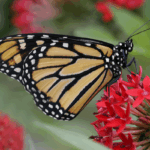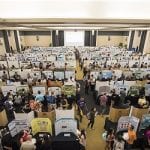Research Area(s)
Eco immunology / disease ecology, evolutionary genetics, sexual selection, sexual conflict, and life history evolution
Research
Our research group explores outstanding questions across several fields of biology including evolution, ecology, animal behavior, eco-immunology, and disease ecology. Several current projects involve understanding how climate change may impact the migration of monarch butterflies, how honey bee viruses spread throughout pollinator communities, how agrochemicals may impact mosquito immune function and the spread of arboviruses, and how uniparentally inherited genetic elements (e.g. Y-chromosomes) influence the evolution of complex phenotypes in counterintuitive ways. For more information about the lab, please visit our website: https://sciences.ucf.edu/biology/fedorka/
Publications
- Malay, A., Weavers, R. and Fedorka, K.M. 2025. Interactions of husbandry, landscape, and immunity in regulation viral loads for managed honey bees. Biology Open, in revision.
- Rich, M., Kesselring, J.H., Garcia, A., Wallin, D. and Fedorka, K.M. 2025. The impact of temperature on the reproductive development, body condition, and mortality of fall migrating monarch butterflies in the laboratory. Royal Society Open Science. In press
- Biazzo, I., Fedorka, K. M., Schneider, K., and Teter, K. 2024. Building Research Communities for life science transfer students: improving retention and student outcomes. Journal of College Science Teaching, 53 (5), 420-429. DOI: 10.1080/0047231X.2024.2373024
- Nielsen, T.M., Baldwin, J., Danis, M. and Fedorka, K.M. 2024. Support for Y-compensation of mother’s curse affecting lifespan in Drosophila melanogaster. Heredity, 133 (6), 418-425. DOI: 10.1038/s41437-024-00726-w
- Nielsen, T.M., Baldwin, J., and Fedorka, K.M. 2023. Gene-poor Y-chromosomes substantially impact male trait heritabilities and help shape sexually dimorphic evolution. Heredity, 130 (4), 236-241. DOI: 10.1038/s41437-023-00596-8
Highlights
February 2024: Lucas Nursery grant (PI: $6,600) to examine migratory monarch butterfly success using stable isotopes
January 2022: Eastern Apicultural Society grant (PI:$1,395) to examine environmental drivers of disease prevalence and intensity across Central Florida honey bees.
June 2021: NSF North American Pollinator Protection grant (PI:$9,993) to examine disease transmission among wild pollinator communities.
January 2018: NSF SSTEM award (PI: $999,995) examining the impact of high impact practices (HIPs) on the success of transfer students.
April 2010: NSF RET award (PI: $15,000) to collaborate with a local high school teacher to provide experience in contemporary research
August 2007: NSF award (PI: $305,000) to examine antagonistic coevolution between male ejaculates and female immune function
August 2007: DOE award (Co-PI: 865,000) to examine the biological response of an ectotherm to climate change
January 2006: NSF award ($50,000)
Education
- Ph.D. Ecology, Evolution and Organismal Biology, 2002 – University of South Carolina
- B.S. Ecology and Evolutoinary Biology, 1994 – University of Pittsburgh


